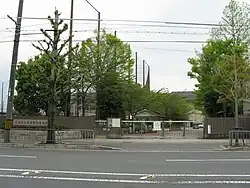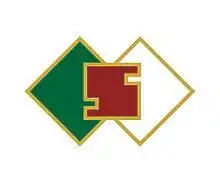Sagano High School
Sagano High School (嵯峨野高等学校), is a nationally designated Super Global[1][2] and Super Science High School in Kyoto, Japan.
| Kyoto Prefectural
Sagano High School 京都府立嵯峨野高等学校 | |
|---|---|
 Front Gate of Sagano High School | |
| Address | |
15 Tokiwa Dan-noue-cho, Ukyo-ku, Kyoto City, 616-8226 | |
| Information | |
| Type | Public, Coeducational |
| Established | 1941 |
| Faculty | approx. 84 |
| Enrollment | approx. 1000 students |
| Average class size | 42 |
| Classes offered | COSMOS Courses, Super Science Courses, Super Global Courses |
| Campus | Urban |
| Color(s) | Crimson, Green, and White |
| Website | www |
History

Brief Timeline:
- 1941 – Sagano was founded as Sagano Girl's High School
- 1950 – Sagano was re-structured as Sagano High School and became a co-ed school
- 1996 – Kyoto's COSMOS courses were established and added to the school's curriculum and plan
- 2010 – 70th Anniversary Celebration school year[3]
- 2012 – Sagano is officially designated as a Super Science High School by the Ministry of Education, Culture, Sports, Science and Technology for a period of 5 years[4]
- 2014 – Sagano is officially designated as a Super Global High School by the Ministry of Education, Culture, Sports, Science and Technology for a period of 5 years[5][6]
- 2014 – Sagano is officially designated as a UNESCO Associated Schools Network UNESCO ASPNet school by UNESCO[7][8]
- 2017 – Sagano is officially re-designated as a Super Science High School by the Ministry of Education, Culture, Sports, Science and Technology for a period of 5 years[9]
- 2022 – Sagano is officially re-designated as a Super Science High School by the Ministry of Education, Culture, Sports, Science and Technology for a period of 5 years[10]

Originally opening as “Sagano Girls' High School” in 1941 and becoming co-ed in 1950, Sagano High School has a history of more than 70 years. It is located in the north-western section of the ancient capital of Kyoto, with areas such as Sagano and Arashiyama being located nearby.[11] The school has two departments, the “General Academic Department” and the “Kyoto Cosmos Department,” the latter of which is a special department established in 1996 in order to provide more advanced-level education which could prepare students for further academic research at universities or other higher educational institutions.[12]

Symbol
The Sagano High School symbol also functions as its logo. It consists of a box-shaped S with two diamonds behind it. The shape of the diamonds is supposed to make one think of the double-peak Narabigaoka mountain, which you can see from the school building.[13]

Motto and creed
The school's motto is: "Empower students for success through synergistic interaction".
The school's creed is:
和敬 – “wakei” – Be harmonious and respectful
自彊 – “jikyo” – Strive for self-improvement
飛翔 – “hisho” – Act globally
The school's goal is to educate and nurture "global learners".[14] [15] [16]
Typical course, class, and school description
Sagano High School has two different program departments, the Kyoto Cosmos Department and General Studies Department. The Kyoto Cosmos Department includes three programs of study, the Super Science High track, a humanities track, and a social-science track.
The school was designated as a “Super Science High School” by the Ministry of Education, Culture, Sports, Science and Technology (MEXT) in 2012 for a 5 year period.[17][18] The school was again re-authorized for another 5 year period in 2017.[19] This designation calls for the school to be "a hub school for science and mathematics education".[20] As such a school, Sagano collaborates with nearby Kyoto University and other research institutions and providing advanced education in the field of natural sciences.[21]
The school was designated as a “Super Global High School” by MEXT in 2014.[22] The research and development focus for this designation will be "Fostering leaders through Kyoto Global Studies utilizing local educational resources and in cooperation with overseas institutes."[23]
Lessons in the Kyoto Cosmos Department are to feature various kinds of unique activities to help develop students’ logical thinking, deep insight and judgment through collaboration with universities and research institutions.[24] Students do small-group research in teams and pick an area of specialization. Students have an opportunity to do hands-on fieldwork, participate in a lecture series, and work on academic research projects and presentations.[25][26]
Most students participate in clubs, i.e. extra curricular activities, including sports clubs and culture related clubs.[27]
The school conducts various exchange programs with international schools as well.[28][29][30]

References
- "(別添1,2)スーパーグローバルハイスクール指定校一覧等" (PDF). Ministry of Education, Culture, Sports, Science and Technology. Retrieved 10 April 2014.
- "平成26年度スーパーグローバルハイスクールの指定について(平成26年3月28日)". Ministry of Education, Culture, Sports, Science and Technology. Retrieved 10 April 2014.
- "沿革". Sagano High School. Retrieved 15 October 2013.
- "Super Science High School SSH". Kyoto Board of Education. Retrieved 10 April 2014.
- "(別添1,2)スーパーグローバルハイスクール指定校一覧等" (PDF). Ministry of Education, Culture, Sports, Science and Technology. Retrieved 10 April 2014.
- "平成26年度スーパーグローバルハイスクールの指定について(平成26年3月28日)". Ministry of Education, Culture, Sports, Science and Technology. Retrieved 10 April 2014.
- "UNESCO Associated Schools Network". UNESCO. Retrieved 10 April 2014.
- "沿革". Sagano High School. Retrieved 29 March 2022.
- "Super Science High School SSH". Kyoto Board of Education. Retrieved 10 January 2022.
- "Super Science High School SSH". Kyoto Board of Education. Retrieved 29 March 2022.
- "嵐山". Agency for Cultural Affairs. Retrieved 10 February 2012.
- "University High School Pass Actual Comparison List of Kyoto". 京都の高校 大学合格実績比較一覧. Retrieved 29 October 2013.
- "Sagano High School Home Page". 京都府立嵯峨野高等学校. Retrieved 8 September 2021.
- "校長あいさつ". Sagano High School. Retrieved 15 October 2013.
- "Koshien – Heritage for the holding of the "first national high school Traditional Culture Festival"". Asahi Shimbun. Retrieved 29 October 2013.
- "京都・嵯峨野高生が狂言熱演 放課後練習「出来は満点」". Asahi Shimbun. Retrieved 29 October 2013.
- "What are Super Science High Schools?". Education in Japan. Retrieved 29 October 2013.
- "Super Science High School SSH". Kyoto Board of Education. Retrieved 29 October 2013.
- "Designated as Super Science High School List Heisei Year 29" (PDF). Ministry of Education, Culture, Sports, Science and Technology. Retrieved 2 June 2017.
- "SSH Super Science High Schools". Japan Center for Promotion of Science Education. Retrieved 29 October 2013.
- "スーパーサイエンスハイスクール(SSH)". Sagano High School. Retrieved 29 October 2013.
- "平成26年度スーパーグローバルハイスクールの指定について(平成26年3月28日)". Ministry of Education, Culture, Sports, Science and Technology. Retrieved 10 April 2014.
- "(別添1,2)スーパーグローバルハイスクール指定校一覧等" (PDF). Ministry of Education, Culture, Sports, Science and Technology. Retrieved 10 April 2014.
- "Kyoto Prefecture Course Information" (PDF). Kyoto Board of Education. Retrieved 29 October 2013.
- "COSMOS Courses". Sagano High School. Retrieved 29 October 2013.
- "Approximately 17,000 People Visited a Special Exhibition on the Recovered Hayabusa Capsule at the Kyoto University Museum". Kyoto University. Retrieved 29 October 2013.
- "National High School soccer tournament". 47news.jp. Retrieved 29 October 2013.
- "Cross-Cultural Trip to Kyoto, Japan "Sagano High School"". Yishun Town Secondary School (YTSS). Retrieved 8 May 2015.
- "嵯峨野高校・アメリカフロリダ研修". Sagano High School SGH Blog. Retrieved 4 April 2016.
- "Japanese students spend day with peers at Jupiter Community High". The Palm Beach Post. Retrieved 4 April 2016.